GCT联考英语常见易混淆词组
2024学位英语易混词汇辨析
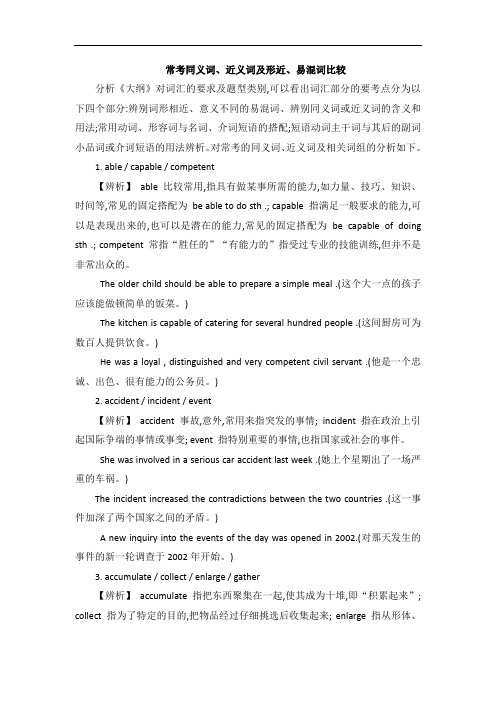
常考同义词、近义词及形近、易混词比较分析《大纲》对词汇的要求及题型类别,可以看出词汇部分的要考点分为以下四个部分:辨别词形相近、意义不同的易混词、辨别同义词或近义词的含义和用法;常用动词、形容词与名词、介词短语的搭配;短语动词主干词与其后的副词小品词或介诃短语的用法辨析。
对常考的同义词、近义词及相关词组的分析如下。
1. able / capable / competent【辨析】able 比较常用,指具有做某事所需的能力,如力量、技巧、知识、时间等,常见的固定搭配为be able to do sth .; capable 指满足一般要求的能力,可以是表现出来的,也可以是潜在的能力,常见的固定搭配为be capable of doing sth .; competent 常指“胜任的”“有能力的”指受过专业的技能训练,但并不是非常出众的。
The older child should be able to prepare a simple meal .(这个大一点的孩子应该能做顿简单的饭菜。
)The kitchen is capable of catering for several hundred people .(这间厨房可为数百人提供饮食。
)He was a loyal , distinguished and very competent civil servant .(他是一个忠诚、出色、很有能力的公务员。
)2. accident / incident / event【辨析】accident 事故,意外,常用来指突发的事情; incident 指在政治上引起国际争端的事情或事变; event 指特别重要的事情,也指国家或社会的事件。
She was involved in a serious car accident last week .(她上个星期出了一场严重的车祸。
)The incident increased the contradictions between the two countries .(这一事件加深了两个国家之间的矛盾。
2023年成人高考专升本英语易混淆词汇

成人高考专升本英语易混淆词汇11.able, capable, competentable为常用词, 指具有做某事所需旳力量, 技巧, 知识与时间等, 一般下效率无关, 用作定语表达能力超过平均水平。
如: .ca.i.abl.t.se.i.th.dark.(猫在黑暗中能看见东西。
)capabl.指满足一般规定旳能力, 可以是体现出来旳, 也可是潜在旳, 搭配是b.capabl.o.+doing.用作定语, 表达旳能力没有able表达旳能力强。
如: .i..minute.(他能在一分钟内跑完一英里。
)H.i..ver.capabl.doctor.(他是一位很好旳大夫。
)competen.指"胜任", "合格", 或受过专业技术等训练旳, 但不是超群旳能力。
如: peten.t.trea.man.diseases.(医生应当能治多种病。
)2.aboard, abroad, board, broadaboar.在船(或飞机, 车)上。
如: .neve.wen.aboar..ship.abroa.副词, 在国外或海外。
如: H.ofte.goe.abroad.boar.为动词, 上(船, 飞机, 车)。
如:Th.passenger.ar.boardin.th.plan.now.broa.为形容词, 广阔旳。
如: H.ha.ver.broa.shoulders.3.accept, receiveaccep.接受, receive"接到", "收到".如: .receive.a.invitatio.yesterday, bu..didn’.accep.it.(昨天我收到了一种请柬, 但并没有接受邀请。
)4.accident, incident, eventaccident事故。
如: .traffi.acciden.(交通事故)incident"附带事件", 在政治上特指导起国际争端或战争旳事件, 事变。
GCT词汇熟记,4天完成你的英语
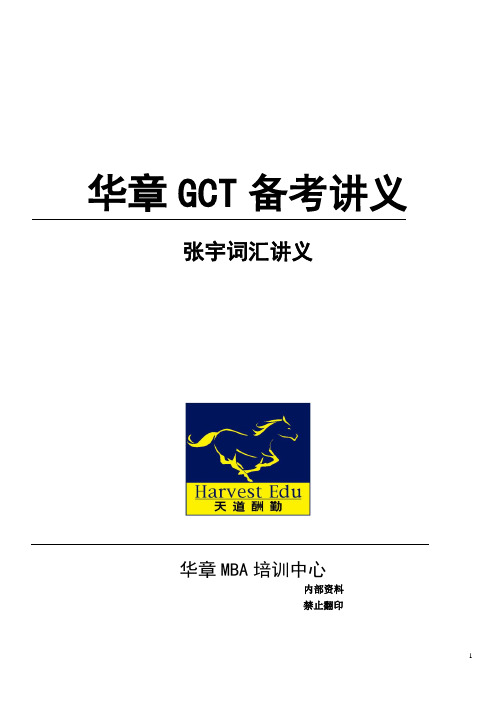
华章GCT备考讲义张宇词汇讲义华章MBA培训中心内部资料禁止翻印GCT 最高频词精讲第一讲近形词辨析(一)1. rise上升,上涨,增加raise举起;种养;提问;募集arise发生,出现arouse激起,唤起2. adapt使适应adjust 使适应;调整adopt采用;收养3. assist帮助,援助consist 由……组成resist抵制,抵抗insist坚持要求;坚持认为persist 坚持继续exist存在4. assure向……保证;使放心ensure确保insure保险5. transmit传播,传输,传送submit呈交,递交;屈服,让步permit允许;许可证commit 干(坏事);承诺,承担责任admit承认;允许……进入emit散发,放出omit 省略;遗漏6. transfer 转换,调动;转移transmit 传播,传送,传输transform 改变,把……变成transact交易,办理transport运输transplant移栽,移植7. consume 消费,消耗;吃掉resume重新开始,恢复assume假定,预设presume假定,预设8. release发布;释放reveal揭示;显示relieve减轻,缓解9. receive收到;接待deceive欺骗,蒙蔽perceive发觉,察觉10. wonder想知道;奇怪wander徘徊;精神恍惚hinder 妨碍,阻止murder谋杀,凶杀shoulder担负,肩负11. confirm确证,证实conform 符合;遵守reform改革;改造inform通知,告发perform 执行,做;表现;表演transform改变,转变;使……变成12. flash闪烁;闪现clash碰撞;碰撞声crush 压碎;压垮crash撞击,撞向;坠毁smash 打碎,粉碎13. assemble集合,集会;装配resemble相像gamble赌博,投机tremble发抖,颤抖humble谦卑的,卑贱的14. distribute分发;分布;分销attribute把……归于contribute 贡献;导致;投稿15. expose暴露impose强加;加税dispose处理掉compose组成,构成oppose反对,对抗propose提议,建议suppose 如果,假如16. maintain维持;维修,保养;主张retain保留,留住;持有sustain撑住,抵御;持续contain含有,包含entertain 使娱乐;款待obtain弄到17. reserve预定;储备,储量deserve应得,值得preserve保存,保鲜conserve保护,节约observe观察;遵守18. converse 交谈reverse 倒退;逆转;背面的diverse多种多样的19. explore 探索;研究;考察exploit 开采,开发;剥削explode 爆炸,爆发;激增explain解释,说明20. cancel取消conceal隐瞒;隐藏concern关注,关心;关系到concept观念,理念,概念concrete 具体的,有形的第二讲近形词辨析(二)21. aspect方面;样子inspect检查,视察suspect怀疑expect期望;预料prospect前景,未来respect 尊敬;问候,敬意speculate思索,推测,投机spectacle场面,景象,眼镜perspective观点,看法22. late晚的,迟的later后来latest最晚的;最新的lately最近,近来the latter (两者中)后者23. constant时常发生的,经常的;恒定的instant 立即的,即刻的distant遥远的,久远的24. conscious 清醒的,有知觉的conscience良知,良心cautious谨慎的25. effort努力affect 影响effect 影响,效果effective有效的efficient高效的sufficient充足的, 充裕的26. refine提炼,精练define给……下定义,限定27. general总的;一般的generous慷慨的,大方的genius天才generate产生28. dense稠密的tense紧张的intense强烈的,剧烈的intensive密集的;深入细致的extensive 广阔的, 广泛的immense巨大的29. contact接触,联系contract订合同,承包;合同contrast对比,对照,差异contest比赛,竞赛content内容;满足的,满意的controversy争论contrary相反的30. review回顾;复习revive振兴,重振revise修订,修改reverse背面的,相反的;逆转revenge报复,复仇revolt反抗,起义31. live活的;现场直播的living活着的;现存的alive活着的(表语)lively生动的;逼真的32. attract吸引,诱惑contract 承包;收缩;合同subtract 减掉,减去33. virtue美德,优点virtual实质上的;虚拟的virus 病毒,害处virgin未开垦过的34. distinct明显的;清晰的extinct灭绝的,绝种的instinct本能35. apply 申请;适用于;应用reply回答,答复imply暗示,意味supply供应;提供36. clarify澄清,阐明classify分类,分级identify识别出;视为相同qualify 使合格,使有资格specify 详细说明,使具体化terrify使害怕,使惊恐justify使……有理由,为……辩护37. access 通道;接近权,享用权assign 委派;分配(任务)assess 评估(财产、价值等)asset 资产38. describe 描写,描述;形容prescribe开药方;规定39. inhabit居住于,栖息于inherit继承40. tend往往是;看护,料理attend出席,参加;照顾,护理extend 延长,延伸;扩展intend打算,想要pretend假装,装扮41. exceed超过,超越proceed行进;继续succeed 成功;继任,继位42. decline谢绝;下降,衰落incline使倾向于underline 强调;给……下划线deadline 最后期限discipline纪律;训练;学科headline大字标题;新问提要outline 提纲;轮廓43. theme主题extreme 极端的;极端supreme至高的,最高的44. depress使沮丧,压抑express表达;特快的impress留下印象suppress镇压;查禁45. external外部的;外面的internal 内部的;里面的export出口,输出import进口,输入46. literary文学的,从事写作的literate 有文化的,识字的liberal自由的;开明的47. involve使卷入;牵涉到revolve使旋转resolve决心;解决dissolve使溶解;解散48. expend 消费,花费expand膨胀;扩大suspend 推迟,暂停;悬挂49. appreciate感激;欣赏,赏识approximate 近似,接近;大约的calculate 计算;打算circulate流通;循环communicate交流,沟通;通讯compensate赔偿,补偿concentrate集中corporate 合作,配合,协作coordinate使协调;并列的decorate 装饰,装璜demonstrate演示,示范;证明50. estimate估计,估价evaluate评价,评估fluctuate波动,起伏illustrate举例说明;加插图,图解imitate模仿,仿效integrate使一体化;使结合在一起liberate 解放,释放negotiate谈判,交涉originate起源于;首创participate参与,参加penetrate 渗入,穿透regulate管制,调节stimulate刺激;激励tolerate 容忍,默许violate 违犯,违背第三讲近义词辨析51. mark标记,记号sign征兆,迹象symbol象征,代表signal信号label标签trace线索,踪迹spot斑点,现场stain圬渍,弄脏52. extend延伸,扩展stretch伸展,拉长prolong延长postpone 推迟,延期delay 延误, 阻止53. enforce使论点有力;强制执行strengthen 增强,强化reinforce加固,增援enlarge放大,扩建expand扩张,扩大54. expensive昂贵的costly代价大的;贵重的valuable有价值的precious珍贵的priceless无价的55. compare比较;比做contrast对比显示差别distinguish区别,区分separate 分开;单独的,分开的isolate隔离56. damage损坏,损伤ruin毁灭spoil宠坏;搅乱harm危害,有害injure使受伤hurt使伤心wreck机、船失事57. replace取代substitute用……代替……trade用……换得……exchange交换58. deny 否认;拒绝给deprive剥夺reject断然拒绝decline谢绝,婉拒ignore不理睬;不顾;忽视neglect疏忽,没留意到59. artificial人造的false虚假的,错误的manual 手动的,人力的fake仿制的,赝品的faulty 劣质的,不完善的counterfeit伪造的,假的60. empty空的,无物的;空洞的blank空白的;茫然的vacant 空缺的;空闲的hollow 中空的margin 页边的空白vacuum真空bald秃头的bare 光秃的;赤裸的61. recover康复;找回restore复原;恢复resume重新开始,继续62. rival竞争对手,敌手enemy敌人companion同伴,伴侣partner合作者;搭档63. path小路,小径;途径route路线,线路lane小巷;车(航)道orbit天体轨道track跑道;轨道;轨迹64. wage 工资(体力劳动)salary薪水(按月/年;专业人员)revenue(国家、企业)收入income(家庭、个人)收入65. disturb打扰,打乱interrupt 打断,中断interfere 干涉,干预;干扰66. chase追逐,追捕;驱赶pursue追捕;追求;从事seek寻找,探索;企图trace追踪track跟踪,追踪67. remove 脱掉;移开delete删除withdraw收回;撤退;提款abandon放弃;抛弃discard丢弃68. tend 照料,看护;往往tame驯服,制服;顺从的breed繁殖,饲养;滋生cultivate 栽培;培养feed喂食;向……供给68. spare备用的;空闲的extra计划外的,额外的additional另外的,附加的69. origin 起源,由来;血统source出处,源头root根源70. element要素;元素substance物质matter物体;事情;要紧issue发布;一期;难题event大事件;比赛项目accident事故,意外incident插曲,小意外affair事务71. previous先前的former前任的;前者prior优先的;在前的72. range变动范围;知识范围scope 营业范围;余地73. ripe成熟的mature成熟的74. scarce缺乏的;不足的rare 罕见的;珍贵的75. fluid流动的,不固定的flowing流淌着的;飘扬的afloat漂浮着的fluent流利的76. assemble聚集,机会summon召集,传唤collect收集,搜集77. alone单独的;单单lonely孤独的,寂寞的single单身的;单一的unique独一无二的sole唯一的,仅有的78. mark 一分,分数grade成绩,分数score比赛得分;评分credit 学分79. routine惯例,例行公事habit (个人)习惯custom(社会)习俗tradition 传统convention守旧;惯例procedure流程,步骤process过程80. site选址;(活动)地点spot现场;约定地点location位置region地区,地带district 区域;行政区zone (有某特点、用途)区域第四讲同根异义词辨析81. considerate体贴的,周到的considerable客观的,大量的82. continual频繁的continuous持续的,不间断的83. sensitive敏感的;灵敏的sensible英明的,明智的sensational轰动的,骇人听闻的84. economic经济上的economical 节约的,节省的85. imaginable可想像的,能想到的imaginary虚构的imaginative富有想象力的86. various各种各样的variable多变的,易变的87. favorite最爱的,喜爱的favorable有利的,适宜的88. industrial工业的,产业的industrious勤奋的,勤劳的89. respectable可敬的,令人尊敬的respectful有礼貌的respective各自的,分别的90. c omparable可比的;比得上的comparative相对的,比较的91. successful成功的successive相继的92. relative相对的,比较的relevant相关的,有关的93. electric电动的,电力的electrical电学的,电的94. visible可见的,有形的visual视觉的,视力的95. passion激情,热情compassion同情,怜悯第五讲重点短语1. 介词短语in turn依次;反过来in return作为回报in advance事先,预先in public当众的,公开地in private私下地in person亲自,本人in vain徒劳in earnest认真地in fact 事实上in addition 另外,而且in common共有的,共同的in detail 详细的in part部分地in time适时地,及时地in a sense从某种意义上说in the face of不顾,面对in the light of按照, 根据in the event of如果发生,万一in case of 万一发生in spite of尽管in favor of赞成,支持in honor of为纪念in terms of就……而说in charge of负责,掌管in front of 在……前方in proportion to与……成比例in relation to涉及,关于i n step with与……步调一致in line with跟……一致,符合in accordance with 依据,与……一致on purpose故意on average平均,通常on sale出售;贱卖on earth究竟,到底on the spot在现场on the whole大体上on the contrary相反on second thoughts进一步考虑后on good terms有良好关系on account of 由于,因为on the ground of基于……的理由on a large/ small scale大(小规模)地by chance/ by accident偶然地,不小心地by mistake错误地by blood/ origin论血缘,论出身by nature天性上by the way顺便地,顺便说by no means绝不by all means无论如何,务必by means of借助于for the sake of为了……的利益for good 永久地for the better向好的方向发展at first 起先,起初at last 最后,终于at least 至少,起码at most 最多,顶多at large 未被捕的,自由的at length详细地at stake 危如累卵,危险的at random随机的,任意的at hand 在手边的, 在附近的, 即将到来的at a loss不知所措at intervals以……间隔at the sight of 一看见at the thought of一想起at the cost of以……为代价at one’s disposal由某人支配,供某人使用2. 动词短语make out the outline of the mountain辨认出make for the exit 向……走去make up the majority 组成make up for the lost time/the loss 弥补cut off the electricity/conversation 切断cut down the expenses 减少cut across抄近道cut in插嘴,插话carry out a plan/a policy/an experiment 执行carry on reading 继续carry over the rest goods 贮存(货物等)供下一季供应run down sb. in the back 诽谤run down the battery 被用完run into difficulty/debts遇到run over his notes/the reports浏览run out of the money 用完The thief broke away from the policeman. 逃离,脱离A fire/war/fight break out.爆发His lecture/the relationship breaks off. 中断,中止Our English will break through. 突破The ice breaks up in the spring. 裂开Atoms break up when tensely heated. 分解The meeting broke up at midnight. 结束His car broke down on his way home. 出故障,崩溃take over the company/the job 接管take up space/time 占据take up a new hobby, English 开始从事take in what you said/students 理解,欺骗take on responsibilities 承担take on more staff 雇佣take after his father in every way 相似,相象put out a fire/light 熄灭put up a notice张贴put up a tent 搭建put off a conference 推迟put up with the noise outside 忍受put forward a new proposal 提出come across my former teacher, an old picture 遇到,偶然碰见come out (news/book ~) 公开,出版come about How does it ~ that your answers are identical to mine?发生come (a)round after operation 苏醒come up with a new idea 想出,提出turn up the radio 开大He hasn’t turned up yet. 露面turn down the music关小turn down his application for the job 拒绝turn out to be wrong 证明是turn out the new model cars 生产turn over the company to me 转交,移交turn to a consultant 求助于call for equality/intensive care 要求,需要call off the meeting 取消call on the government/sb 呼吁/拜访call at the construction site 访问call up the public to join in the campaign号召lay out a plan 计划,安排lay down a new regulation 制定,立法lay off some staff 解雇lay in some food 储存,囤积set about contacting the company 开始做,着手处理set off/set out before dark 出发,启程set back the traffic延缓,阻断set aside some money every month 留出,拨出fall out ~ with each other over the education of the child 争吵fall through A plan/A policy ~ 落空;失败fall back to bank account 求助于,依靠fall behind落后get across the plan 使人理解get by 通过;逃脱get over difficulties/ fear 恢复,克服get at his secrecy 得到;查明get down to his business 开始go off (食)变质;断电go by what your supervisor says 遵守go by appearance 根据……判断go into details of the occurrence 研究,探讨go over his notes/the account 浏览;检查。
50组考试易混淆重点英语词汇分类辨析

50组考试易混淆重点英语词汇分类辨析英语中有些单词十分相似,我们明明都认识,却经常记混意思,因此,这些易混淆词汇都是极易丢分的知识点之一。
本文为大家整理50组高频易混淆词,记得收藏记忆。
after, in这两个介词都可以表示“……(时间)以后”的意思。
after以过去为起点,表示过去一段时间之后,常用于过去时态的句子中。
例句:She went after three days.她是三天以后走的。
in以现在为起点,表将来一段时间以后,常用于将来时态的句子中。
例句:She will go in three days.她三天以后要走。
how long, how often, how soonhow long指多长时间,主要用来对一段时间(如three days, four weeks等)提问。
例句:How long ago was it?这是多久前的事了?how often指每隔多久,主要用来对频率副词或状语(如once a week等)提问。
例句:—How often does he come here?—他(每隔)多久来一次?—Once a month.—每月一次。
how soon指再过多久,主要用来对表示将来的一段时间(in an hour, in two weeks 等)提问。
例句:How soon can you come?你多快能赶来?few, a few, little, a little, several, somefew和little的意思是否定的,表示“很少”或“几乎没有”;a few和a little的意思是肯定的,表示“有一些,有一点儿”。
few和a few修饰可数名词;little和a little修饰不可数名词。
several用于修饰可数名词,语意比a few和some更肯定,含有“好几个”的意思。
some可修饰可数名词,也可修饰不可数名词,从数量上说,它有时相当于a few或a little,有时指更多一些的数量。
GCT常考词组随机顺序(记忆版)
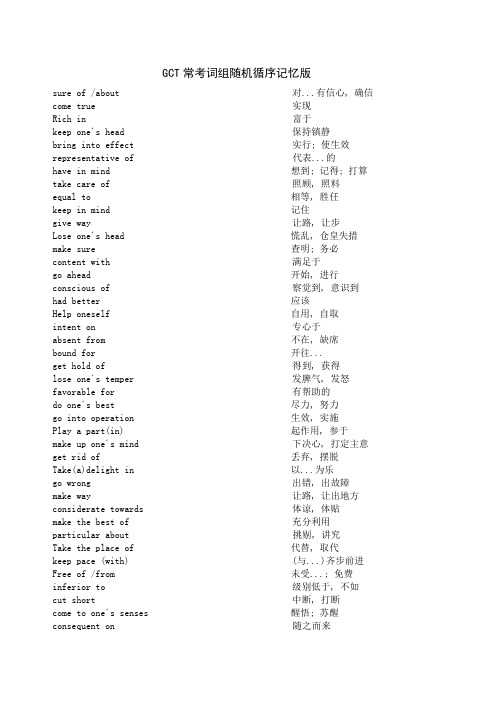
GCT常考词组随机循序记忆版sure of /about 对...有信心, 确信come true 实现Rich in 富于keep one´s head 保持镇静bring into effect 实行; 使生效representative of 代表...的have in mind 想到; 记得; 打算take care of 照顾, 照料equal to 相等, 胜任keep in mind 记住give way 让路, 让步Lose one´s head 慌乱, 仓皇失措make sure 查明; 务必content with 满足于go ahead 开始, 进行conscious of 察觉到, 意识到had better 应该Help oneself 自用, 自取intent on 专心于absent from 不在, 缺席bound for 开往...get hold of 得到, 获得lose one´s temper 发脾气, 发怒favorable for 有帮助的do one´s best 尽力, 努力go into operation 生效, 实施Play a part(in) 起作用, 参于make up one´s mind 下决心, 打定主意get rid of 丢弃, 摆脱Take(a)delight in 以...为乐go wrong 出错, 出故障make way 让路, 让出地方considerate towards 体谅, 体贴make the best of 充分利用particular about 挑剔, 讲究Take the place of 代替, 取代keep pace (with) (与...)齐步前进Free of /from 未受...; 免费inferior to 级别低于, 不如cut short 中断, 打断come to one´s senses 醒悟; 苏醒consequent on 随之而来piece together 拼合contemporary with 与...同时代essential to/for 必不可少appropriate for/to 适当, 合适make the most of 充分利用make use of 使用, 利用make a /the difference 有影响,起作用guilty of 有...罪的independent of 不受...支配anxious about/for 忧虑, 担心prior to 在...之前Gain an advantage over 胜过, 优于let alone 更别提, 不打扰indignant with sb. 愤慨void of 没有, 缺乏subject to 受制于, 易于similar to 相似clever at 善于take turns 依次, 轮流expert at/in/on 善于ashamed of 羞愧, 害臊can not help 禁不住, 忍不住opposite to 在对面popular with 受...喜爱, 爱戴catch fire 着火; 烧着impatient of 无法容忍Pay attention to 注意parallel to 与...平等, 类似fit for 适于Bear in mind 记住Take part (in) 参加, 参于mad about/on 狂热迷恋invisible to 不可见的indifferent to 无兴趣, 不关心put to use 使用comparable to/with 可比较put into operation 实施; 使生效critical of 挑剔, 批评leave alone 不打扰, 不干预distinct from 种类(风格)不同fearful of 惧怕let go (of) 放, 松手apt at 聪明, 善于necessary to /for 必要的short of 缺少responsible for 负责, 是...原因close to 接近, 亲近skilled at /in 善于Sick of 厌恶, 厌倦Mad at/with sb. 生气, 愤怒mad with 因...发狂favorable to 支持, 赞成impatient for 急切, 渴望ignorant of 不知道impatient at sth. 不耐烦superior to 优于,级别高于sensible of 觉查到May as well 还不如, 不妨keep one´s word 守信用certain of /about 确信, 肯定think better of 经考虑改变对..的看法hungry for 渴望catch one´s breath 喘气,松口气;屏息liable to 易于set fire to 使燃烧, 点燃get the best of 战胜carry into effect 施行; 使生效doubtful of /about 怀疑east of 在...东面equivalent to 等于, 相当于lose heart 失去勇气, 丧失信心Next to 下一个, 其次clear of 没有, 不接触find fault (with) 找岔come into operation 施行, 实行, 生效angry with sb at/about sth 生气, 愤怒innocent of 无...罪,无辜catch sight of 看到, 发现see that 注意, 务必, 保证available to sb for sth 可用, 可供get together 会面, 装配uncertain of /about 不确知be friends with 与...友好had rather...than 宁愿...而不愿... familiar with sth 熟悉, 通晓take pains 努力, 尽力, 下苦功fatal to 致命的Give rise to 引起, 导致patient with 有耐心try one´s best 尽力, 努力Lose sight of 忘记, 忽略; 看不见Take into account 考虑contrary to 违反familiar to sb 为...所熟悉never mind 不要紧; 不用担心crazy about 热衷, 着迷take for granted 认为...理所当然catch one´s eye 引人注目make fun of 取笑, 嘲弄put into effect 实施; 使生效enjoy oneself 过得快活make sense 讲得通, 言之有理make one´s way 去, 前往fond of 喜欢relative to 与...有关cast light on/upon 阐明, 使了解bare of 几乎没有, 缺乏be about to do 刚要,即将keep on 爱好, 很喜欢could not help 禁不住, 忍不住free with 康慨, 大方peculiar to 独特的, 独有的see to it that 注意, 务必, 保证abundant in 富于put into practice 实施; 实行faithful to 忠实于learn by heart 记住, 背诵Take one´s time 不着急, 不着慌loyal to 忠于apt to 易于get the better of 战胜, 占上风sufficient for 足够的take effect 生效, 起作用take a chance 冒险, 投机careful of/about/with; 小心, 注意capable of 能够Take...for 把...认为是take advantage of 利用,趁...之机jealous of 嫉妒tired of 对...不在感兴趣take place 发生, 进行, 举行liable for 对...有责任bring into operation 实施; 使生效Lead the way 引路, 带路to throw light on 阐明, 使了解go into effect 施行, 实行, 生效make friends 交朋友had rather 宁愿aware of 意识到counter to 与...相反vital to 对...关系重大suspicious of 怀疑open to 不限制, 开放的curious about 好奇, 想知道suitable for/to 适合于have an advantage over 胜过, 优于applicable to 适用于alien to 与...相反typical of 是典型的, 特有的Take care 当心, 注意keep an eye on 留意, 照看approximate to 近似, 接近fall in love with 爱上have nothing to do with 和..毫无关系foreign to 非...所原有come into effect 生效; 实施Take charge 管理, 接管sensitive to 对...敏感about/in doing characteristic of 特有, 独特。
GCT词汇训练答案
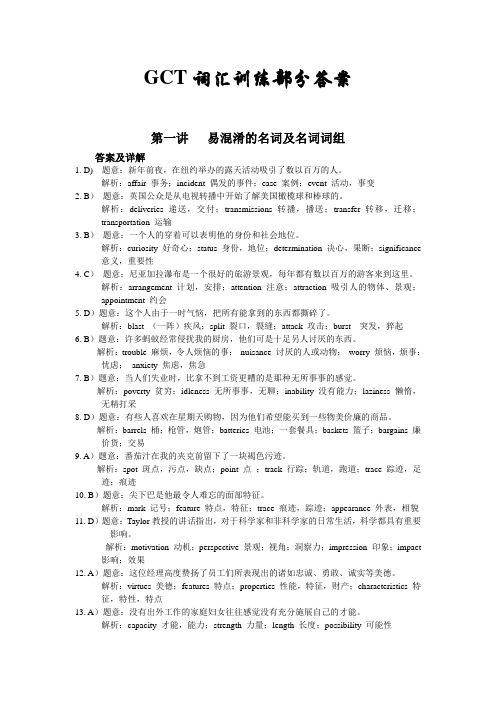
GCT词汇训练部分答案第一讲易混淆的名词及名词词组答案及详解1. D) 题意:新年前夜,在纽约举办的露天活动吸引了数以百万的人。
解析:affair 事务;incident 偶发的事件;case 案例;event 活动,事变2. B)题意:英国公众是从电视转播中开始了解美国橄榄球和棒球的。
解析:deliveries 递送,交付;transmissions 转播,播送;transfer 转移,迁移;transportation 运输3. B)题意:一个人的穿着可以表明他的身份和社会地位。
解析:curiosity 好奇心;status 身份,地位;determination 决心,果断;significance 意义,重要性4. C)题意:尼亚加拉瀑布是一个很好的旅游景观,每年都有数以百万的游客来到这里。
解析:arrangement 计划,安排;attention 注意;attraction 吸引人的物体、景观;appointment 约会5. D)题意:这个人由于一时气恼,把所有能拿到的东西都撕碎了。
解析:blast (一阵)疾风;split 裂口,裂缝;attack 攻击;burst 突发,猝起6. B)题意:许多蚂蚁经常侵扰我的厨房,他们可是十足另人讨厌的东西。
解析:trouble 麻烦,令人烦恼的事;nuisance 讨厌的人或动物;worry 烦恼,烦事;忧虑;anxiety 焦虑,焦急7. B)题意:当人们失业时,比拿不到工资更糟的是那种无所事事的感觉。
解析:poverty 贫穷;idleness 无所事事,无聊;inability 没有能力;laziness 懒惰,无精打采8. D)题意:有些人喜欢在星期天购物,因为他们希望能买到一些物美价廉的商品。
解析:barrels 桶;枪管,炮管;batteries 电池;一套餐具;baskets 篮子;bargains 廉价货;交易9. A)题意:番茄汁在我的夹克前留下了一块褐色污迹。
GCT英语词汇表及词组

AA,anart.一(个);任何一个;每,每一件abandonv.放弃;抛弃abilityn.能力,智能;才能,才干ablea.有能力的,能干的,显示出才华的able to inf. 能,会aboardad.在船(飞机,车)上,上船(飞机,车)prep.在(船,飞机,车)上,上(船,飞机,车)abortionn.流产,夭折aboutad.在周围,附近,到处;大约,差不多prep.关于,对于;在…周围,在…附近a.准备be about to+inf.即将aboveprep.在…上面,超过,高于a.上面的,上述的ad.在上面,以上above all首要,尤其abroadad.到国外,在国外;到处absencen.缺席,不在场;缺乏,没有absenta.(from)缺席,不在场;缺乏的漫不经心的absolutea.绝对的,完全的absorbv.吸收;吸收,使专心be absorbed in专心于abusen.滥用,虐待,辱骂;陋习,弊端V 滥用,虐待,辱骂academica.学院的;学术的acceptv.接受,认可;同意,认可acceptablea.可接受的acceptancen.接受,验收;承认,认可accessn.接近,进入;入口,通道,入口;接近(或进入)的方法have/gain access to可以获得accidentn.事故;意外的事,偶然的事by accident偶然accompanyv.陪同,伴随;为…伴奏accomplishv.完成according to按照,根据accountn.账(目,户);叙述,说明v.说明,解释account for说明(原因等)on account of因为,由于take …into account考虑accuratea.精确的,准确的accusev.(of)控告,谴责accustomeda.惯常的,习惯的be accustomed to习惯于achev.痛n.疼痛,酸痛achievev.完成;达到,达成,获得achievementn. 完成;达到, ,获得acidn.酸a.酸的acquirev.取得,获得;学到acren.英亩acrossprep.横过,穿过;在...对面,与...交叉ad.横过,穿过,横断;宽,阔actv.行动,做事;(on)起作用;表演n.行为,动作;(一)幕;法令,条例actionn.行动,行为;动作,活动;(on)作用activea.有活力的,活跃的,敏捷的,在活动中的activistn.积极分子,活动分子actorn.男演员actressn.女演员actuala.实际的,现实的ActuallyAd.事实上ad=advertisementn.广告adaptv.(to)(使)适应,适合;改编,改写addv.(to)加,增加;补充说,又说add up to合计,总计additionn.(增)加,加法;附加(物)in addition另外in addition to除...之外addressn.地址,通讯处,致词v.致函,写姓名地址;向...讲话adequatea.足够的,充分的,恰当的v.毗连,靠近adjustv.调节,调整,校正)administrationn.管理,经营;行政(机关,部门);政府admirev.钦佩,赞赏,羡慕admitv.让...进入,接纳;承认adoptv.采用,采纳,通过;收养adultn.成(年)人a.成年人的,已成熟的advancev.前进,进展;推进,促进;提出(建议等);提前n.前进,进展;预付,预支in advance提前,预先advanceda. 高级的,先进的,前进的advantagen.优点,长处,有利条件;利益,好处gain/have an advantage over胜过,优于take advantage of利用adventuren.冒险,冒险活动;奇遇advertisev.做广告advertisementn.广告advicen.劝告,忠告,(医生等的)意见advisablen.可取的,适当的advisev.劝告,忠告;建议;通知v.提倡,鼓吹aeroplane/airplanen.飞机aerospacen.太空,宇宙空间affairn.事,事情,事件affectv.影响;感动affectionn.爱,慈爱,感情;影响affordv.担负得起,买得起,花得起(时间);供给,给予afraida.(of)怕,害怕的;恐怕,担心的African.非洲Africana.非洲(人)的n.非洲人afterprep.在…以后,在...后面conj.在...后ad.以后,后来afternoonn.下午,午后againad.又,再(次),重新againstprep.对(着),逆;反对;违反;靠近,倚在;对比agen.年龄;时期,时代v.变老,老化agoad.以前,...前agonyn.苦恼,痛苦agreev.(to,with)同意,赞成;一致,适合agreementn.同意,一致;协定,协议agriculturen.农业aheadad.在前,向前,提前,前头ahead of在...前面,先于aidv.援助,救援,帮助n.援助,救护;助手,辅助物,辅助设备aimv.(at)目的在于,旨在;瞄准,针对n.目标,目的airn.空气,大气,天空;神气,架子v.使通风in the air在流行中,在传播中aircraftn.航空器,飞机airlinen.航线;航空公司airplanen.飞机airportn.机场,航空站alarmn.警报;惊恐,惊慌v.使惊恐,惊动,惊吓;向...报警alcoholn.酒精,乙醇alikea.相同的,想像的alivea.活着着;活跃的,热闹的alla.所有的,全部的pron.一切,全部ad.完全,都,十分above all首要,尤其after all终于,毕竟;虽然这样all but几乎,差一点;除...之外其余都all out全力以赴,竭尽全力all over遍及,到处all right行,可以;顺利,良好at all完全,根本in all总共,共计not at all一点也不allowv.允许,准许;承认;让...得到allow for考虑到allowancen.津贴,补助(费)make allowance(s) for考虑到,顾及;体谅,原谅almostad.几乎,差不多alonea.单独,独立,独一无二的ad.仅仅,只;单独地,独自leave/let...alone听其自然,不要去管let alone更不用说alongprep.沿着ad.向前along with与...一起aloudad.出声地,大声地alphabetn.字母表alreadyad.已,已经alsoad.也,同样;而且,还alterv.改变,变更althoughconj.尽管,虽然,即使altogetherad.完全,全部地;总共;总之aluminum/aluminiumn.铝alwaysad.永远,始终;总是,一直amazev.使惊奇,使惊愕,使惊叹amazinga.令人惊讶的,令人吃惊的,ambitionn.雄心,野心ambitiousa.有雄心的,野心勃勃的ambulancen.救护车American.美洲;美国Americana.美洲(人)的;美国(人)的n.美国人;美国人among(st)prep.在…之中,在...中间amountn.数量,总额v.(to)合计,总共达,等于amusev.逗...笑,给...以娱乐(消遣)analysisn.分析,分解analyze/analysev.分析,分解ancestorn.祖宗,祖先anchorn.锚v.抛锚,停泊ancienta.古代的,古老的andconj.和,与,而且;那么;接连,又angeln.天使angern.(愤)怒,气愤v.使发怒,激怒anglen.角;角度,方面,观点angrya.愤怒的;生气的;(风雨等)狂暴的animaln.动物,野兽,牲畜a.动物的,野兽的anklen.踝announcev.宣布,发表,通行;报告...的来到annoyv.使恼怒,使生气,打搅annuala.每年的,年度的n.年刊,年鉴anothera.另一,再一;别的,不同的pron.另一个,类似的一个one after another一个接一个one another互相answerv.回答,答复,响应;(for)负责,保证;(to)符合,适合n.回答,答复,答案antarctica.南极(区)的n.[the Antarctic]南极洲,南极(圈)antennan.天线anxietyn.挂念,焦虑,焦急,忧虑;渴望,热望anxiousa.(about)忧虑的,担心的,焦急的;渴望的anya.[否定,疑问,条件句中]什么,一些;任何的,任一的pron.无论哪个,无论哪些;一个,一些ad.稍,丝毫anybodypron.任何人,无论谁;重要人物anyhowad.不管怎样,无论如何;不论用何种办法anyone=anybodypron.任何人,无论谁anythingpron.无论什么事(物),一切;什么事(物),任何事(物)anything but除...以外任何事(物),根本不anyway=anyhowad.无论如何anywheread.在什么地方,无论哪里apart2ad.撇开;分开,分离;相距,相隔apart from除去apologyn.道歉,歉意,认错apparatusn.器械,设备,仪器,装置apparenta.(to)明显的,显而易见的;表面的,貌似的appealv.(to)呼吁,要求;对...有吸引力;申述,上诉n.(to)呼吁,要求;吸引力;申诉,上诉appearv.出现,显露;出场,问世;来到;好像是,仿佛appearancen.出现,出场,露面;外表,外貌,外观appetiten.食欲,胃口;欲望,爱好,要求applen.苹果(树)appliancen.用具,器具appliantn.申请者applicationn.请求,申请(书,表);应用,运用;施用,敷用applyv.(for)申请,请求;(to)适用,应用,运用appointv.任命,委任;约定,指定appointmentn.任命,委任;约定,指定appreciatev.感谢,感激;正确评价,欣赏,赏识approachv.靠近,接近,邻近n.方法,途径;探讨appropriatea.(to)适当的,恰如其分的approvaln.赞成,同意;认可,批准approvev.(of)赞成,满意,同意;批准,审定,通过approximatelyad.近似地,大约Apriln.四月Arabn.阿拉伯人a.阿拉伯的Arabiann.阿拉伯人a.阿拉伯(人)的archaeologyn.考古学architecturen.建筑(式样,风格);建筑学arctica.北极(区)的n.[the Arctic]北极,北极圈arean.面积;地区,区域;范围,领域arguev.争论,辩论;主张,论证;说服argumentn.争论,辨认;论据,论点arisev.出现,发生;(from)由…引起,由...产生arithmeticn.算术armn.(手)臂,臂状物;扶手,衣袖;[pl.][总称]武器,武装v.武装,装备armyn.军(队),陆军;大群aroundad.各处,到处;周围,在附近;大约prep.在...周围,在...附近,在...各地arousev.唤醒,唤起;激起,引起arrangev.整理,排列,布置;安排,筹备arrangementn.安排,准备工作;整理,布置arrestv./n.逮捕,拘留arrivaln.到来,到达;到达的人或物arrivev.到达,来到arrive at达到,得出arrown.箭;箭头(符号),箭状物artn.艺术,美术;技术,技艺;[pl.]文科,人文学科articlen.文章,论文;物品,商品;项目,条款;冠词artificiala.人工的,人造的;人为的,娇揉造作的artistn.艺术家,美术家artistica.艺术(家)的,美术(家)的asad.一样,同样conj.像...一样;由于;正当;以致;虽然,尽管prep.作为,如同ashn.灰(烬)ashameda.(of)羞耻,惭愧,害臊Asian.亚洲Asiana.亚洲(人)的n.亚洲人asidead.在旁边,到旁边aside from除...以外askv.(询)问;请求,要求;(邀)请,约请asleepa.睡着的aspectn.样子,外表,面貌;(问题等的)方面assemblev.集合,集会,会议;装配assemblyn.集合,集会,会议;装配assessv.估价,评价assetn. (pl.)资产,财产;有用的资源,宝贵的人/物;优点,益处assignv.分配,委派;指定(时间,地点等)assignmentn.分配,委派;任务,(课外)作业assistv.帮助,援助,协助assistantn.助手,助教a.辅助的,助理的associatev.(with)使联系,使联合;交往,结合n.合作人,伙伴,同事,同行a.副的associationn.协会,团体;联合,联系,交往;联想assumev.假装;假定,设想;采取,承担;呈现assurev.使确信,使放心;保证,担保astonishv.使惊讶,使吃惊astronautn.宇航员astronomyn.天文学atprep.[表示地点,位置,场合]在,于,到...处;[表示时刻,时节,年龄]在...时,当;[表示目标,方向]对着,向;[表示速度,价格等]以,在...方面athleten.运动员Atlantica.大西洋的n.[the Atlantic]大西洋atmospheren.大气(层);空气;气氛,环境;大气压(压力单位)atomn.原子;微粒,微量atomica.原子的,原子能的在职攻读硕士学位全国联考英语考试大纲词汇表第 3 页attachv.(to)缚上,系上,贴上;使依附,使隶属,使依恋attached to附属于,隶属于attackv./n.攻击,进攻,抨击;着手,开始n.(病)发作attemptv.尝试,试图n.(at)企图,努力attendv.出席,参加;(to)照顾,护理attentionn.注意(力),留心;立正pay attentin to注意attituden.(to,towards)态度,看法;姿势attorneyn.律师attractv.吸引,招引,引诱,引起(注意等) attractionn.吸引,吸引力attractivea.有吸引力的,引起兴趣的,动人的attributen.属性,品质,特征v.(to)把…归于;认为...是...所为auctionn.拍卖vt.拍卖audiencen.听众,观众,读者;谒见,会见audion./a.声音(的),听觉(的);音频(的),音响(的)Augustn.八月auntn.伯母,婶母,姑母,舅母,姨母Australian.澳大利亚,澳洲Australiana.澳洲的;澳大利亚(人)的n.澳大利亚人authorn.作者;创始人authorityn.权力,威信,权威;权威者,有权威性的典籍;[pl.]当局,官方auton.汽车automaticn.自动机构a.自动的,无意识的,机械的automobilen.汽车autumnn.秋(季)auxiliarya.辅助的,补助的availablea.可用的,可得到的;可以见到的,随时可来的avenue n.林荫道,大街;途径,手段averagen.平均(数)a.平均的;通常的,一般的avoidv.避免,回避,逃避awakea.醒着的,警觉的v.唤醒,唤起;醒,觉醒,醒悟到,认识到awardn.奖(品)v.授予,奖给awarea.(of)知道的,意识到的awayad.离开,远离;…去,...掉;不断...下去right away立即,马上awfula.极度的,极坏的,糟糕的;威严的,可怕的ad.十分,极度地awkwarda.笨拙的,不灵活的;棘手的,尴尬的;使用不便的ax/axen.斧(子)axisn.轴(线);构图中心线Bbabyn.婴儿,孩子bachelorn.单身汉;[亦作B-]学士(学位)backn.背(面),后面a.后面的ad.在后,向后;回,回复;以前v.后退;支持backgroundn.背景,经历backwarda.向后的,倒行的,落后的;迟钝的ad.(also backwards)向后,朝反方向bacterium([pl.]bacteria)n.细菌bagn.袋,包baggagen.行李balancev.称,(使)平衡n.天平,称;平衡,均衡;差额,结余,余款balln.球,球状物;舞会balloonn.气球bananan.香蕉bandn.条,带;乐队;波段;一群,一伙v.缚,绑扎bankn.岸,堤;银行,库v.存入银行bankern. 银行家bankrupta.破产的barn.条,杆,棒,棍,闩;酒吧,餐柜;栅,栏,障碍(物)v.闩上,阻拦,拦住,妨碍barbern.理发师barea.赤裸的,光秃的,空的;稀少的,仅有的v.露出,暴露bargainn.廉价货;交易,契约,合同v.议价,成交barkv.吠叫,咆哮n.吠声,狗叫声barreln.桶;枪管,炮管barriern.栅栏,屏障;障碍(物)basen.基础,底部;基地,根据地v.(on)把...基于,以...为根据baseballn.棒球basementn.建筑物的底部,地下室,地窖basica.基本的,基础的Basicallyad.基本地,根本地basinn.盆,脸盆;内海,盆地basisn.基础,根据on the basis of根据,在...的基础上basketn.篮(子),篓basketballn.篮球bathn.沐浴,洗澡;浴室(池,盆)v.(给...)洗澡batteryn.电池(组);炮兵连,炮组battlen.战役,战斗;斗争v.战斗,斗争,搏斗bev.(就)是,等于;(存)在;到达,来到,发生beachn.海滩,湖滩,河滩beamn.(横)梁,桁条;(光线的)束,柱v.微笑;发光4beann.豆;菜豆,蚕豆bearn.熊v.忍受,容忍;负担,负荷;结果实,生子女beardn.胡须beastn.兽,牲畜;凶残的人,举止粗鲁的人beatn.敲打,敲击声,节拍;(心脏等)跳动,搏动v.打,敲;打败,战胜;(心脏等)跳动,搏动beautifula.美(好)的beautyn.美(丽);美人,美丽的东西becauseconj.因为becomev.成为,变得;适宜,同...相称bedn.床(位);苗床,圃,花坛;河床,矿床,海底been.(蜜)蜂beefn.牛肉beern.啤酒beforeprep.在…以前;在...前面,当着...的面conj.在...之前ad.前面,从前,早些时候begv.乞求,乞讨;请求,恳求beggarn.乞丐,穷人beginv.开始beginningn.开始,开端behalfn.利益on behalf of代表,为了behavev.举止,举动,表现;运转,开动behavior/behaviourn.行为,举止;(机器的)特性behindprep.在…后面,落后于ad.在后,向后,落后beingn.生物,人;存在,生存beliefn.信仰,信条;相信,信念believev.(in)相信,信仰;认为bell n.钟,铃belongv.(to)属于,附属,隶属;应归入(类别,范畴等)beloveda./n.受爱戴的,敬爱的;爱人,被心爱的人belowprep.在...下面,在...以下ad.在下面,向下beltn.(皮)带,腰带;地带benchn.长凳,条凳;(工作)台,座bendv.(使)弯曲;屈从,屈服n.弯曲(处),曲折处beneathprep.在…下边,在...之下ad.在下方beneficiala.(to)有利的,有益的benefitn.利益,好处,恩惠v.有益于;(from,by)受益benta.弯曲的besideprep.在…旁边,在...附近;与...相比besidesprep.除...之外ad.而且,还有besta.最好的ad.最,最好(地)betv.赌,打赌n.打赌,赌注bettera.较好的,更好的ad.更好(地)v.改良,改善n.较佳者,较优者betweenprep.在(两者)之间ad.当中,中间beyondprep.在(或向)...的那边,远于;迟于;超出ad.在那边,在远处Biblen.圣经bicyclen.自行车bidv.祝愿;命令,吩咐;报价,投标n.出众,投标biga.大的,巨大的;重大的,重要的biken.自行车billn.账单;招贴,广告;单子,清单,(人员,职称等的)表;钞票billionnum./n.[美]十亿,[英]万亿bindv.捆,绑,包括,束缚biographyn.传记biologyn.生物学birdn.鸟,禽birthn.出生,分娩;出身,血统birthdayn. 生日biscuitn.饼干,点心bitn.一点,一片,一些bitev./n.咬,叮n.一口bittera.(有)苦(味)的;痛苦的,厉害的blacka.黑(色)的,黑暗的n.黑人,黑色blackboardn.黑板bladen. 刀刃,刀片;叶片;翼blamev.责备;怪,怨,把…归咎于n.责任,过错;责备blanka.空白的,空着的;失色的,无表情的n.空白;表格blanketn.毛毯,毯子blastn.一阵(风),一股(气流);爆炸冲击波;管乐器或汽笛声v.爆炸,爆破bleedv.出血,流血blinda.瞎的;盲目的v.使失明;蒙蔽n.百叶窗blockn.大块木料(或石料,金属);一排房屋,街区;阻塞v.阻塞,拦阻,封锁bloodn.血(液);血统,宗族,门第;血气,气质bloomn.花(朵);开花(期)v.开花blowv.吹(气),充气,打气;吹响(乐器,号角等),吹风;爆炸,爆裂在职攻读硕士学位全国联考英语考试大纲词汇表第 5 页n.打,殴打,一击,打击bluea.(天)蓝色的,青的;伤心的,沮丧的,忧郁的n.蓝色boardn.板,木板,纸板;全体委员,委员会,部门;伙食;船舷v.上船(车,飞机)on board在船(车,飞机)上boastv.(of,about)自夸,夸耀n.自夸,大话boatn.小船,艇bodyn.身体,躯体,本体;主体;尸体;物体;(一)群,批,堆boilv.(使)沸腾,煮(沸)bolda.大胆的,勇敢的;冒失的;黑体的,粗体的boltn.螺栓,(门,窗的)插销v.闩(门),关窗,拴住bombn.炸弹v.投弹于,轰炸bondn.结合(物),粘结(剂),联结;公债,债券,契约bonen.骨(骼)bookn.书(籍);卷,篇,册v.预定,订(票,房间等)boomv.迅速发展,兴旺;发出隆隆声bootn.(长统)靴boothn.电话亭,货摊bordern.边界,国界;边(沿)v.交界,与...接壤;接近borev.钻(孔),挖(洞),打眼,钻探;烦扰,使厌烦n.讨厌的人,麻烦事boringa.令人厌烦的n. 钻孔borna. 出生的;天生的,生来的n.(心)胸borrowvt. 借,借用bossn.工头,老板,上司v.指挥,支配,发号施令bothpron.二者,双方a.两,双both...and既...又...,两个都botherv.打扰,烦扰;烦恼,操心n.麻烦bottlen.瓶(子)v.装瓶bottomn.底(部);基础,根基;海底,湖底,河床boundv./n.跳(跃)a.被束缚的,理应...的,必定的,一定的;准备(或正在)到...去的,开往...的boundaryn.分界线,边界bowv./n.鞠躬,点头n.弓(形);蝴蝶结bowln.碗(状物),钵boxn.箱(子),盒(子);包厢v.拳击,打耳光boxingn. 拳击boyn.男孩;男服务员,男仆brainn.(大)脑,骨髓;[pl.]脑力,智能brakev./n.制动(器),闸,刹车branchn.(树)条,分支;分部,分店;(学科)分科,部门;支流,支脉,支线brandn.商标,标记,牌子v.使铭记;打火印,打烙印bravea.勇敢的breadn.面包breadthn.宽度,幅breakv.打破,折断,破碎;使中止,打断;破坏,违反n.打断,中止;休息时间breakdownn.垮,衰竭;损坏,故障,倒塌breakfastn.早饭,早餐v.吃早饭breastn.胸膛,乳房breathn.呼吸,气息breathev.呼吸,吸入breedv.(使)繁殖,生殖;产生,引起;教养,抚养,饲养n.品种,种类breezen.微风,和风brickn.砖(状物)briden.新娘bridgen.桥(梁)v.架桥,建桥briefa.简短的,简洁的v.简短介绍,简要汇报brighta.明亮的,辉煌的;聪明的,伶俐的;欢快的,美好的brillianta.光辉的,灿烂的;卓越的,有才华的bringv.带来,拿来;引起,导致Britisha.不列颠的;英国(人)的brittlea.易碎的,脆(弱)的broada.宽的,广阔的;广大的,广泛的;宽宏的,豁达的bronzen.青铜(色),青铜制品brothern.兄弟;同胞;教友brown.眉(毛);额browsev./n.浏览brownn./a.褐色(的),棕色(的)brushn.刷(子),毛刷;画笔v.刷,擦,掸,拂;擦过,掠过bubblen.泡,水泡,气泡v.冒泡,起泡,沸腾bucketn.水桶,吊桶budgetn.预算v.做预算buildv.造,建筑,建设,建立build up积累,堵塞;树立,逐步建立;增进,锻炼buildingn.建筑(物),房屋,大楼bulkn.体积,容积;主体,大批,大量,大块in bulk散装;大批,大量bulletn.子弹,枪弹bunchn.(一)簇,束,捆,串bundlen.捆,包,束burdenn.担子,负担,重担bureaun.署,局,司,处burnv.燃烧,烧毁,烧伤6n.烧伤,灼伤burn out烧掉burstv.爆裂,炸破;突然发生,突然发作n.突然破裂,爆发buryv.埋(葬),安葬;埋藏,遮盖busn.公共汽车trolley bus无轨电车bushn.灌木(从)businessn.商业,生意;事务,业务,职责on business因公,因事busya.忙的,繁忙的;(with)忙于...的v.使忙于butconj.可是,但是,而;除...外prep.除...外ad.只,仅仅,不过but for除...以外,倘没有,除非butchern.屠夫,卖肉者buttern.黄油,奶油v.涂黄油于...上butterflyn.蝴蝶buttonn.纽扣,按钮(开关)v.扣紧;扣上纽扣buyv.(购)买n.购买,买卖byprep.在...旁,靠近;被,由;经,沿,通过;不迟于,到...时为止;根据,按照;[表示方法,手段]靠,用,通过ad.在近旁,经过byeint. 再见CCabn.出租车cabbagen.洋白菜,卷心菜cabinn.客舱,机舱;小(木)屋cabinetn.橱柜;内阁cablen.电报;电缆;缆,索,钢丝绳v.拍电报cagen.鸟笼caken.饼,(蛋)糕calciumn. 钙calculatevt. 计算,推算;估计,推测;计划,打算calculatorn. 计算器calendarn.日历,月历calln.叫喊,呼声;(电话)通话v.叫(喊),招呼;把...叫做,称...为;(on,at)访问,拜访;打电话calma.(天气,海洋等)静的,平静的;镇静的,沉着的n.平静,风平浪静v.(使)平静;(使)镇定cameln.骆驼cameran.照相机,摄影机campn.野营,营地;帐篷,阵营v.设营,宿营campaignn.战役;运动campusn.(大学)校园canaux.v.能,会;可以;可能n.罐头v.装罐头Canadiana.加拿大的n.加拿大人canaln.运河;(沟)渠cancelv.取消,把...作废;删去,划掉cancern.癌candidaten.候选人,候补者;报考者candlen.蜡烛candyn.糖果n.帆布;油画布,油画capn.便帽,军帽;盖,罩,套v.覆盖于...顶端capabilityn. 能力,才能;性能,容量capablea.有本领的,有能力的;(of)可以...的,能...的capacityn.容量,容积;能量,能力;接受力capitaln.首都,首府;大写字母;资本,资金a.首位的,最重要的,基本的captainn.首领,队长;船长;上尉v.做...的首领,指挥capturev./n.捕获,俘虏v.夺得,攻占carn.车(辆),汽车;(火车)车厢carbonn.碳carbon dioxide二氧化碳cardn.卡片,名片;纸牌;纸片ID card身份证credit card信用卡caren.小心,谨慎,注意;关怀,操心,照料v.(about)关心,介意,计较careern.生涯,经历;专业,职业carefula.小心的,仔细的;细致的,精心的cargon.船货,货物carpetn.地毯carriagen.(四轮)马车;(火车)客车厢carriern.搬运人;载体carrotn.胡罗卜carryv.运送,搬运;传送,传播;领,带cartoonn.漫画,幽默画;动画片casen.箱,盒,容器;情况,事实;病例;案件in any case无论如何,总之in case假如,以防(万一),免得in case of假使,万一in no case决不cashn.现金,现款v.兑现,付(或收)现款castv.投,扔,掷,抛;铸造n.演员表castlen.城堡casuala.偶然的,碰巧的;临时的,非正式的catn.猫catalog/cataloguen.目录(册)v.编目(录)catchv.捕捉,捕获;赶上;感染;理解,听到categoryn.种类,类目catchvt.捕,捉;赶上;感染,染上病;听清楚cattlen.牛;牲口,家畜causen.原因,理由;事业,事件,奋斗目标在职攻读硕士学位全国联考英语考试大纲词汇表第7 页v.使产生,引起caven.洞,穴ceilingn.天花板celebratev.庆祝celln.细胞;小房间;蜂房;电池Celsiusa.摄氏的cementn.水泥;胶泥,胶接剂v.胶合;巩固,加强centn.分(币);百per cent百分之center/centren.中心(区),中央v.集中centigraden./a.摄氏温度计(的);百分度(的) centimetre/centimetren.厘米centrala.中心的,中央的,中枢的;主要的centuryn.世纪,(一)百年ceremonyn.典礼,仪式;礼节,礼仪certaina.某,某一,某些;(of)一定的,确信的,可靠的certificaten.证(明)书,执照chainn.链(条);[pl.]镣铐;一连串,一系列,连锁v.用链条拴住chairn.椅子;主席(职位)chairmann.主席,议长,会长,董事长challengen.挑战(书);艰巨任务,难题v.向...挑战chambern.房间,室championn.冠军,得胜者;拥护者,斗士chancen.机会;可能性,或然性;偶然性,运气v.碰巧,偶然发生changen.改变,变化;零钱,找头v.更换,调换,交换,互换;改变,变化channeln.海峡,水道;信道,波道;路线,途径chaptern.章(节),回charactern.性格,品质,特性,特征;人物,角色;字符,(汉)字characteristica.(of)特有的,独特的n.特征,特性characterize/characterisev.表示...的特性;描述...特性chargev.索(价),要(人)支付,收费;控告,指控;充电n.[pl.]费用,代价;电荷,负荷in charge (of)负责,主管take charge of担任,负责chartn.图,图表chasev./n.追逐,追求chatv./n.闲谈,聊天cheapa.便宜的;低劣的,不值钱的cheatv.欺骗;作弊n.骗子;欺诈,欺骗行为checkv.检查,核对;制止,控制;(凭票)托运或寄存n.(=cheque)检查,核对;方格图案,格子织物check/chequen.支票cheekn.面颊,脸cheerv.(使)振奋,(使)高兴v./n.喝彩,欢呼cheerfula.愉快的,高兴的cheesen.干酪,乳酪chemicala.化学的n.[pl.]化学制品,化学药品chemistn.化学家;药剂师chemistryn.化学cheque/checkn.支票,空白支票;总收入chessn.棋chestn.胸腔,胸膛;箱,柜chewv.咀嚼;思量chickenn.小鸡,小鸟;鸡(肉)chiefa.主要的,首要的n.首领,领袖child([pl.]children)n.小孩,儿童,儿女childhoodn.幼年,童年chilln.寒冷,寒气,寒战v.使寒冷chillya.寒冷的chimneyn.烟囱chinn.下巴,颏chinan.瓷器Chinan.中国Chinesen.中国人;中国话;中文,汉语a.中国(人)的,中国话的,汉语的chipn.切屑,碎片;(土豆等的)薄片;集成电路块chocolaten.巧克力(糖),赭色choicen.选择(机会),抉择;供选择的种类,选择项;入选者,精华a.精选的,上等的,优等的choosev.选择,挑选;甘愿chopv.砍,劈,斩n.排骨,肉块Christiann.基督教徒a.基督教徒的Christmasn.圣诞节churchn.教堂;[C-]教会cigarette/cigaretn.香烟,纸烟,卷烟cineman.电影院;电影,影片circlen.圆,圆周;圈子,集团;周期,循环v.环绕,旋转circuitn.环行,周线,巡回;电路,线路circulara.圆(形)的,环形的;循环的n.传单,通报circulatev.(使)循环,(使)流通circumstancen.[pl.]情况,形势,环境;经济情形,境况citizenn.公民;市民,居民cityn.城市,都市civila.公民的,市民的;国内的,民间的;民用的;有礼貌的,文明的;文职的civilization/civilisationn.文明,文化civilize/civilisev.使文明,开化claimv.要求;声称,主张;索赔n.要求;主张,断言;索赔;权利,要求权,所有权clarify8v.澄清,阐明clarityn.清晰,明晰classn.班级,年级;(一节)课;阶级,阶层;等级,类别v.把...分类(或分等)classicn.[pl.]杰作,名著a.第一流的,不朽的,古典的classicala.经典的,古典(文学)的classificationn.分类,分级classifyv.分类,分等(级)classmaten.同班同学classroomn.教室,课堂clausen.(正式文件或法律文件的)条款;从句,分句clawn.爪,脚爪clayn.粘土,泥土cleana.清洁的,干净的;洁白的v.打扫,使干净cleara.清晰的,明白的;清朗的;清澈的,明亮的;畅通的,无阻的ad.清楚地,清晰地,明白地v.澄清,清除,扫清;使清澈,使清楚变晴clerkn.职员,办事员;店员clevera.聪明的,伶俐的,机敏的,精巧的Clickn. 一击clientn.顾客;(诉讼)委托人cliffn.悬崖;峭壁climaten.气候;风气,社会思潮climbv./n.攀登,爬clingv.(to)粘住;依附;坚持clinicn.诊所clinicala. 门诊的,临床的clockn.钟clonen.克隆v.克隆coden.代码,代号,密码,编码closev.关,闭;结束,了结n.结束,了结a.(to)近的,接近的;关闭着的;秘密的,不公开的;严密的,紧密的ad.接近地,紧密地clothn.(一块)布,织物,衣料clothev.(给…)穿衣,供给...衣服clothesn.衣服clothingn.服装,被褥cloudn.云(状物);遮暗物,阴影;一大群cloudya.多云的,阴(天)的;混浊的,模糊的clubn.俱乐部,夜总会;社团;棍棒,球棒cluen.线索,暗示coachn.(铁路)客车,长途汽车,大客车;辅导员,教练,私人教师v.教练,辅导,指导coaln.煤,煤块coarsea.粗糙的,粗劣的;粗鲁的,粗俗的coastn.海岸,海滨coatn.外套,上衣;皮毛,表皮,涂层v.涂上,盖上,包上cockn.公鸡,雄鸡;龙头,开关coden.代码,代号,密码;法典,法规,规划coffeen.咖啡(色)coilv.卷,盘绕n.(一)卷,(一)圈;线圈,绕组coinn.硬币,货币v.铸造(硬币),创造(新词)colda.寒冷的;冷淡的n.感冒;寒冷collapsev./n.倒坍,崩溃,垮台collarn.衣领;环状物colleaguen.同事,同僚collectv.收集,搜集;领取,接走;收(税等);聚集,堆积collectionn.收藏(品),收集(物)collectiven.集体a.集体的,共同的collegen.学院,高等专科学校,大学collidev.碰撞,冲突;(with)抵触collisionn.碰撞,冲突colonyn.殖民地color/colourn.颜色,彩色;颜料;肤色v.给...着色,染colorfula. 多彩;丰富多彩的columnn.圆柱,柱状物;列;(报刊中的)专栏combinationn.结合,联合,合并;化合(物)combinev.(with)(使)结合,联合;(使)化合comev.来,来到;出现于,产生;是,成为;开始,终于come off实现,成功,奏效come on请,来吧,跟着来,快点;开始,来临;进展,发展;出场,上演come out出版,刊出;出现,显露,长出;结果是,结局是;被解出come round/around来访,前来;苏醒,复原come through经历,脱险come to总计,达到;苏醒,复原come true实现,达到come up走近,上来;发生,被提出come up to达到,符合come up with提出,提供comfortn.舒适,安逸;安慰,慰问v.安慰,使舒适comfortablea.舒适的,自在的commandn.命令,指令;统帅,指挥(权);掌握,运用能力v.命令;指挥,统帅commandern.司令官,指挥官commentn.注释,评论,意见v.(on)注释,评论commercen.商业,贸易commerciala.商业的,商务的,贸易的commissionn.委员会;委任,委托(书),代办;佣金,手续费commitv.把...交托给,提交;犯(错误),干(坏事)committeen.委员会,全体委员commodity在职攻读硕士学位全国联考英语考试大纲词汇表第9 页n.商品,物品commona.普通的,平常的;(to)共同的,公共的in common共用,共有,共同communicatev.传达,传送;交流;通讯,通话communicationn.通讯,传达,传送,交流;[pl.]通讯系统;[pl.]交通(工具)communismn.共产主义communista.共产主义的communityn.同一地区的全体居民,社会,社区;共同体companionn.同伴,共事者;伴侣companyn.公司,商号;陪伴,同伴;宾客,客人;连(队),(一)群,(一)队,(一)伙keep company with与...交往,与...结伴comparablea.(with,to)可比较的,比得上的comparativea.比较的,相当的comparev.(with,to)比较,相比,对比;比作compare...to把...比作comparisonn.比较,对比,比喻,比拟by comparison比较起来compelv.强迫,迫使compensatev.(for)补偿,赔偿competev.比赛;竞争competenta.有能力的,胜任的competitionn.比赛;竞争competitorn.竞争者,敌手complainv.(about,of)抱怨;申诉complaintn.抱怨,诉苦;申诉;疾病completea.完全的,圆满的v.完成,结束,使完满complexa.复杂的;合成的,综合的n.联合体complicateda.错综复杂的,麻烦的,难解的complicationn.复杂,纠纷;并发症componentn.组成部分,成分,元件,部件a.组成的,合成的composev.组成,构成;(of)由...组成;创作(作曲,诗歌等)composern.作曲家;创作者compositionn.作品,作文,乐曲;写作,作曲;结构,组成,成分compoundn.混合物,化合物a.混合的,化合的,复合的comprehensiona.理解(力),领悟computern.计算机,电脑;计算者concealv.隐藏,隐瞒,隐蔽concentratev.(on)集中,专心;浓缩n.浓缩物concentrationn.专注,专心;集中;浓度conceptn.概念,观念,思想concernv.涉及,关系到v./n.关心,挂念n.(利害)关系as/so far as...be concerned就...来说be concened with关心,挂念,从事于concertn.音乐会,演奏会;一齐,一致concludev.结束,终止;断定,下结论;缔结,议定conclusionn.结束,终结;结论,推论in conclusion最后,总之concretea.具体的,有形的,实质性的n.混凝土v.用混凝土修筑,浇混凝土condemnv.谴责,指责;判刑,宣告有罪conditionn.状况,状态;[pl.]环境,形势,条件on condition that在...条件下conditionern.调节装置,空调conductn.行为,举动,品行v.引导,带领;处理,管理;指挥(乐队);传导,传(热,电等)conductionn.传导conductorn.领队,(乐队)指挥;(电车等的)售票员,列车员;导体,导线conferencen.会议,讨论会confidencen.(in)信任;信心,自信;秘密,机密confidentn.(of,in)确信的,自信的confirmv.使更坚固,使更坚定;(进一步)证实;确认,批准conflictn.战斗,斗争;抵触,冲突v.(with)抵触,冲突confusev.使混乱,混淆confusionn.混乱,混淆congratulatev.(on)祝贺,向...致贺词congratulationn.(on)祝贺,[pl.]祝贺词congressn.(代表)大会;[Congress](美国等国的)国会,议会connectv.(with)连接,连结connection/connexionn.联系,连接conquerv.征服,战胜,占领;克服,破除(坏习惯等)consciencen.良心,良知consciousa.(of)意识到的,自觉的;有意识的,神志清醒的conservevt..保存,保护,节约;守恒,不灭considerv.认为,把...看作;考虑,细想;体谅,照顾considerablea.相当大(或多)的,可观的;值得考虑的consideratea.考虑周到的,体谅的considerationn.需要考虑的事,理由;考虑,思考;体谅,照顾consistv.(in)在于,存在于;(of)由…组成,由...构成consequentadj.作为结果的,随之发生的constanta.经常的,不断的;坚定的,永恒的,忠实的n.常数,恒量n.成分,要素constructv.建设,建造,构造;创立consultv.与...商量,请教;查阅;(with)商量,商议consultantn.会诊医师,顾问医生;顾问consumev.消费,消费,耗尽consumern.消费者,用户contactv./n.(使)接触,联系,交往contain10。
英语考试17组高频易混词
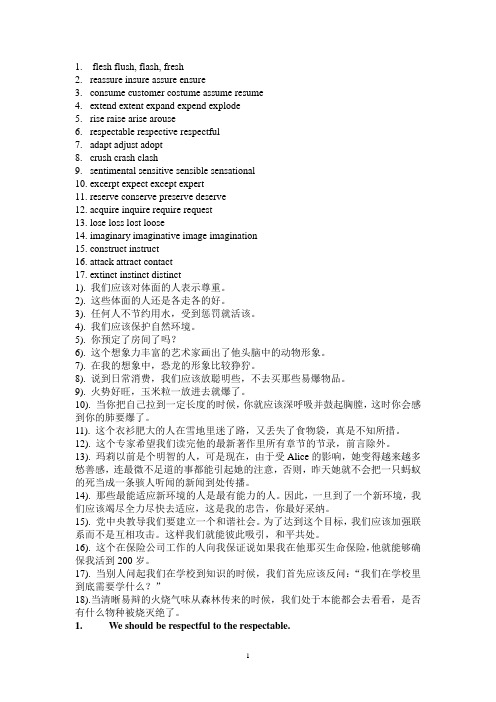
1. flesh flush, flash, fresh2.reassure insure assure ensure3.consume customer costume assume resume4.extend extent expand expend explode5.rise raise arise arouse6.respectable respective respectful7.adapt adjust adopt8.crush crash clash9.sentimental sensitive sensible sensational10.excerpt expect except expert11.reserve conserve preserve deserve12.acquire inquire require request13.lose loss lost loose14.imaginary imaginative image imagination15.construct instruct16.attack attract contact17.extinct instinct distinct1). 我们应该对体面的人表示尊重。
2). 这些体面的人还是各走各的好。
3). 任何人不节约用水,受到惩罚就活该。
4). 我们应该保护自然环境。
5). 你预定了房间了吗?6). 这个想象力丰富的艺术家画出了他头脑中的动物形象。
7). 在我的想象中,恐龙的形象比较狰狞。
8). 说到日常消费,我们应该放聪明些,不去买那些易爆物品。
9). 火势好旺,玉米粒一放进去就爆了。
10). 当你把自己拉到一定长度的时候,你就应该深呼吸并鼓起胸膛,这时你会感到你的肺要爆了。
11). 这个衣衫肥大的人在雪地里迷了路,又丢失了食物袋,真是不知所措。
12). 这个专家希望我们读完他的最新著作里所有章节的节录,前言除外。
- 1、下载文档前请自行甄别文档内容的完整性,平台不提供额外的编辑、内容补充、找答案等附加服务。
- 2、"仅部分预览"的文档,不可在线预览部分如存在完整性等问题,可反馈申请退款(可完整预览的文档不适用该条件!)。
- 3、如文档侵犯您的权益,请联系客服反馈,我们会尽快为您处理(人工客服工作时间:9:00-18:30)。
GCT联考英语--常见易混淆词组ask after问候(身体健康)ask for要求;请求back down 放弃要求,让步back up支持;堵塞;后退break away摆脱,逃跑break down(机器)出故障;中断;分解break into闯入;打断;突然开始break off 中断, 折断, 突然停止break out突然发生;爆发break through突破;克服;挣脱而出break up打碎;中断bring about 引起;造成bring down 使倒下;使下降;使受挫折bring forward 提出;提前 (= put forward) bring into operation 实施,使生效;使运行bring out显示出来;出版,生产bring up提出;教育;培养burn down 烧毁;烧掉burn out 烧光;熄灭;疲乏burn up烧尽;烧旺nothing but只,只不过not only … but also不但…而且…all but 差不多,几乎;除了…都anything but绝不;一点也不;单单除…之外but for要是没有,要不是 (注意:常+虚拟语气) by and by不久以后;不一会儿by and large 一般来说,大体上by itself自动地,单独地by oneself单独地,独自地call for需要;要求;邀请call off取消;停止call on拜访;看望;号召call up打电话;使人想起;召集carry off拿走,抓走,赢得(奖章等)carry on继续下去;从事carry out执行,贯彻;实现carry through 完成,进行到底check in办理登记手续check out结帐后离开;检验,检查check up / on 检查,检验clear away把…清除掉;扫除clear up清理;澄清;(天气)放晴come about发生come across偶遇;碰到;讲清楚come along进展;成功;一道走come into effect生效come off 发生;举行;成功come on快点;走吧;有进展come out 出来;结果是;出版come round/around 再现;恢复知觉;改变看法come through经历,获得成功come to苏醒;达到;总数为come up发生;走上前来;(时间)快到come up against碰到(困难)come up to达到(高度、程度);符合come up with赶上;提出compare to把…比作;比为compare with比较;与…相比count on依靠,依赖count up算出…总数,总计count sb in (out) 把某人(不〕算进去cut across绕近道穿过;超越;遮住cut back削减;终止;急忙返回cut down削减;减少cut in插嘴,打断;突然出来cut off切断;中断;隔绝cut out删掉;戒掉cut short中断;打断;缩短deal in买卖;经销deal out分配deal with论述;涉及;与…打交道die down逐渐消失;变弱die out消失灭绝draw in到站;吸收;使加入draw on利用;支取;吸draw up起草;制定;(使)停住drop by / in顺便来访,非正式访问drop off掉下;入睡;(让)…下车drop out退出;退学;掉出fall back on求助于;转而依靠fall behind落后fall in with同意, 依从fall out争吵;脱落fall through落空;失败get across解释清楚;使人了解;通过get along相处;有进展,有起色get at得到;够得着;查明get away离开;出发;逃脱get by通过;逃脱;过get down to开始,着手get hold of抓住;掌握;获得;找到get in收获;进入;到达get into进入;对…发生兴趣;促使某人卷入某事get off下(车);逃脱惩罚get on上车;进展get on to转入(另一话题或活动);同…联系get on with继续做;在…方面获得成功;相处get out 泄露;说出;离去get over克服困难;解决;恢复过来get rid of避免,摆脱;除去get the better of占上风;胜过get through接通(电话);完成get together集会;召集;收集give away to泄露;赠送;告发give back送还;恢复give in屈服,让步;交上,呈上give off释放出;辐射出;发生give out放出;发表;用完give rise to产生;使发生;引起,导致give up投降;放弃;辞去give way让位,让路;让步;(情感等)失控go after追求;追逐go ahead继续下去;开始go along with赞成;支持;随行go around / round足够分配;绕…而行;传播go back on违背诺言go by时间过去;经过;遵守go down下降;下沉;下跌go for去;选择;想要;攻击(用语言)go in for从事,爱好;参加(竞赛,考试)go into研究;调查;从事go off离开;爆炸;食品变坏;断电go on继续进行;发生go out离开;熄灭;过时go over浏览,仔细查看,检查,审查go through通过;经历(苦难);仔细检查go up上升,增长;涨价go wrong出毛病;发生故障,走错路hang about闲荡,闲待着hang on抓紧不放;由…决定; 别挂断hand down传下去;传递;传给hand in交上;递交hand on传下来;传递hand out分发,散发hand over交出;移交at hand在近处,在手边;即将到来by hand用手;由专人送的;用体力in hand在进行中,待办理on hand在手边;临近on (the) one hand一方面hold back踌躇;阻止 (= keep back);保密hold on抓住;坚持hold out伸出;坚持;不屈服hold up举起;阻挡lay aside把…搁置一旁,收起;积累lay down放下;拟订,规定lay off(临时)解雇;休息,戒lay out设计;安排;展示leave alone不打扰,听其自然leave behind忘了带,不带;遗留;落后leave off停止,中断leave out漏掉,删掉;省略let down加长放下,降低;使失望let go (of)放开,松手let off排放;放过;宽恕;(在…)下车let out放走,释放;发出(声音);泄露look after照顾;关心look at看;观察;查阅look back回头看;回顾look down on / upon轻视,看不起look for寻找,寻求;期望look forward to盼望;期待look in顺便看望;顺便拜服look into调查,深入了解look on观看,旁观look out注意look over翻阅,浏览look through浏览;详细调查look up查阅,查出;看望lose heart丧失勇气,失去信心lose ones head被砍头;丧命;慌张lose ones temper发怒,发脾气lose sight of看不见;忘记,忽略make a / the difference区别对待;起重要作用;有影响make for快速走向,向…前进;促进make friends交朋友make fun of嘲弄,取笑make ones way前去;去make out理解,领悟;写出;辩论make sense有意义;言之有理make sure弄确实,查明make the best / most of充分利用make up组成,占…比例;弥补,补偿;捏造;make up for弥补,补偿make up of由…组成;包含有make up ones mind决心,决定make use of使用,利用make way让路,腾出地方live on靠…生活;维持生命live through经受住;度过live up to不辜负;遵守诺言pass away去世;死了pass on通过,传给,传递pay attention to注意pay back还钱,偿还;报复pay off还清(债);得到好结果pick out挑选出;辨认出pick up捡起;学会;半路搭人;加快pull down拆毁;降低pull out拔出,抽出;(火车)离站pull up停下 ,停车beside point离题;不相干的on the point of即将…的时候point out指出,指明to point 切题off point离题put across解释清楚;使人接受put aside放在一边;储存;保留put away放好;收好put down写下;记下;镇压put forward提出;推荐;把…提前put in伸进;提出;提交;申请,请求put in for 申请;正式要求put into effect实行;执行put into operation实施,使生效,使运行put off延期;推迟;关掉;阻止,妨碍put on穿上;戴上;上演;增加(体重)put on speed 增加速度put out熄灭;关灯;生产出,出版put to use使用,利用put up举起;修建;提供put up with忍受;容忍in question在讨论中beyond question 无疑out of question无疑 =beyond question out of the question不可能的,办不到的in regard to关于,至于regardless of不管,不顾with regard to 关于as regards 关于= as forring off挂断电话ring up打电话run across偶然遇到run down(被)耗尽;(健康)衰退;撞倒;诽谤;减少run into偶然遇到;碰上(困难);与…相撞run out (of)(常与of连用)用光;耗尽run over匆匆地看一遍;浏览;(车)碾过run through浏览,匆匆读完let alone更不用说see off为某人送行see through识破,看透see to留心,照料,注意see to it that设法使,务必要,保证send for派人去请send in呈送,提交send off送别;发送,邮寄set about开始做,着手set apart使分离;使显得突出set aside留出;拨出;不理会set back推迟,阻碍;使花费set down记下,写下set fire to点燃,纵火set free释放set off动身出发;引起set out动身出发;开始;陈述set off的原义是使爆炸(cause to explode)set out 在用来表示"着手做"(begin with a definite purpose)时,后面总是跟动词不定式。
